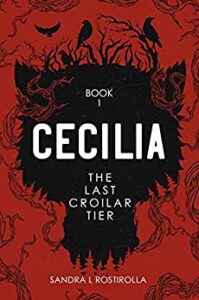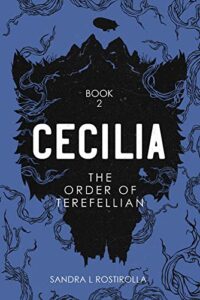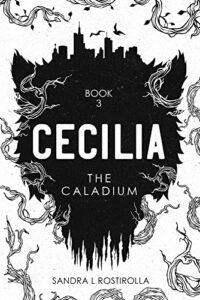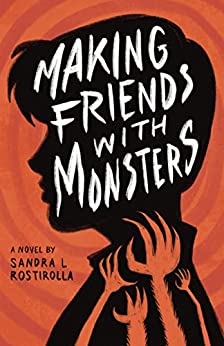
Making Friends With Monsters received a 4+ star review, making it an IndieReader Approved title.
Following find an interview with author Sandra L. Rostirolla.
What is the name of the book and when was it published?
My book is called Making Friends With Monsters, and it’s scheduled for release April 4th, 2023.
What’s the book’s first line?
The moment Dad picks up the phone, a sickening feeling races through my stomach, like I know something bad is going to happen.
What’s the book about? Give us the “pitch”.
Twelve-year-old Sam feels like his life is spiraling out of control. Ever since learning a secret, his once loving older brother, Ben, has become angry, causing extreme tension at home. Ben’s behavior has a knock-on effect, resulting in a series of tragedies that send Sam’s entire family into chaos. Sam knows that the monsters that live inside people are really to blame for all the mess, and he sets out to discover how to stop them before they swallow him, too.
What inspired you to write the book? A particular person? An event?
A few years ago, I was back home in Sydney, Australia, doing a book signing for my debut YA/Fantasy, when a school friend told me her heartbreaking story. A year or so prior, her ex died of suicide and she was left with three young daughters, ages 11-15.
My friend said to me, “I can handle all of it except for when my daughter says to me, ‘Mummy, why did Daddy do it?’ That’s when I break down, because I have no idea what to say.”
My heart caved because my dad died of suicide when I was thirteen. Since then, two of my brothers have also passed the same way. During the fifteen-hour plane ride back to Los Angeles, all I could think was, “If anyone can help speak to this, I could.” I almost felt as though it was my duty to help. Making Friends With Monsters is definitely a case of a story finding the author, not the other way around. (I was supposed to start Book 2 of my fantasy series, but put it off in order to write this story).
What’s the main reason someone should really read this book?
My goal with this book is not to give an answer as to the “why”. When it comes to something like this, no one can. What I want is to offer children and parents was a language where they feel comfortable talking about feelings that often get buried because no one knows how to even begin the conversation. I’d initially thought people who had faced a devastating loss would benefit most from reading my book, but after receiving feedback from readers, it seems anyone who wants to learn a little bit more about themselves—what drives their emotions (or that of others)—can gain insight from my story.
What’s the most distinctive thing about the main character? Who-real or fictional-would you say the character reminds you of?
Sam is a very honest narrator. He’s a realist with a vivid imagination, who doesn’t shy away from exploring his dark side. He’s not looking for perfection, but rather, an authentic connection with his family and friends. To say Sam reminds me of any one person is tough. He’s an amalgamation of many people in my life: My Mum’s unflinching ability to accept people as they are; my sister (who is also a middle child) and her quiet patience with her four boisterous siblings; and Sam’s fear at watching his older brother deteriorate mirrors my experience with my eldest brother.
A fictional character who might come close to Sam is Scout from To Kill A Mockingbird. They are both intelligent, introspective (especially regarding the good and bad within themselves and others), they are both kind-hearted, and they stand out from their peers.
When did you first decide to become an author?
The passion was always there, but since I was a STEM girl, the teachers pushed me in that direction. I actually struggled in English (grammar & reading comprehension was not my thing). The only time I received high marks was on creative writing assignments, where spelling & grammar had a low weight.
I didn’t take writing seriously until I came to Los Angeles and took a story analysis class at UCLA Extension. When the instructor said that most people who are good at math are good at plotting and story, I gave myself permission to shed my “imposter syndrome” and admit out loud that I wanted to write. Reading Stephen King’s book, On Writing also helped disassemble some barriers. In the book, he talks about a writer having a toolbox and how you only need write to the skill of the instruments in your box. After reading that statement, I realized that I didn’t have to be a “literary writer” with an unearthly command of the English language. I could write at a level that matched who I was—someone who wanted to make people laugh and cry, while taking them on a vivid journey into worlds or situations never before imagined.

Making Friends With Monsters is the second book I’ve written, but the 4th one I’ve published. My first book was Cecilia: The Last Croilar Tier, an award-winning YA/fantasy. While editing Making Friends With Monsters, then going through the long, laborious submission process with agents and publishers, I wrote and published Cecilia: The Order of Terefellian and Cecilia: The Caladium (Books 2 & 3 of The Cecilia Series)
What do you do for work when you’re not writing?
When I’m not writing, I work in development for a film production company. My days are spent reading scripts, or if I’m on a film, which I am right now, it’s a lot of coordinating and offering creative input as we work on the edit, special effects, sound design, and music.

This varies as my job doesn’t have a set schedule. Some days, I only need to work a few hours. Other days, I’m busy from sunup to sundown. I tend to set a goal for words (as opposed to saying I will write for “x” hours today). I learned this from Stephen King’s On Writing. When work is slow, I try to get 1,500 words done a day. When I’m busy, I shoot for 500 words.
What’s the best and the hardest part of being an indie?
The hardest part about being an indie author is doing everything on your own as it really siphons away from writing time. Publishing requires the development of skills that don’t necessarily come naturally, so there’s a bit of a learning curve. The other challenge we face are closed doors. Many publicists won’t work with indies; many outlets won’t review our books; many bookstores won’t stock us; and many influencers aren’t interested in reviewing self-published books. The best part is that I can pretty much write whatever I want.

Strangle the desire to go back and re-read what you’ve written until you’ve finished the first draft. Re-reading is a form of procrastination. We do it because it makes us feel busy, but really, what we’re doing is just “busy work.” We’re not pushing the plot forward. When I start a new day of writing, I go back no further than a paragraph in order to catch up with my story. If I’m on a roll and I don’t know the name of a place or a character, rather than stopping the creative flow, I’ll leave a note for myself to fill it in later. Writers need to trust the process and not let themselves get bogged down in the minutia. Trust your characters, they will take you on their journey. At the early stages, the story might seem like a tangled mess, but if you keep the faith, things will come together in the end. Lastly, don’t think about the finish line, it will drive you crazy. A book is a marathon, not a sprint. Pace yourself, stick to your goals, and before you know it, you’ll have a completed draft. Then you can go back and start changing things.
Would you go traditional if a publisher came calling? If so, why?
It would all depend. If (when) Making Friends With Monsters starts selling like hotcakes, a publisher would have to present a pretty compelling plan in order to inspire my giving up the royalty split I have with my distributors. If a publisher wanted to offer an advance on my current WIP, The Isles of Tirimdra—a YA/Fantasy series set on a mythical set of islands and the quest to find out what happened to the magic that once filled the lands—then I would absolutely be open to a chat.
Is there something in particular that motivates you (fame? fortune?)
Being the film buff that I am, I’d love to see one of my stories on the silver (and small) screen. I see Making Friends With Monsters as a theatrical film, whereas my fantasy trilogy is more suited to television.
Which writer, living or dead, do you most admire?
When I think about the books that influenced me the most, then I have to say S.E. Hinton for The Outsiders—what an inspiration to know she was only about 15/16 when she wrote that book. And to write such a male dominated story, with such edge… it was truly amazing. Harper Lee for To Kill A Mocking Bird was also a big influence. Along with the book’s ease of writing, I fell in love with Scout.
Which book do you wish you could have written?
If I want to go for the money, then, of course, Harry Potter. But I’m not interested in laying claim to someone else’s story. After reading The Book Thief by Markus Zusak, what I envied the most were the little nuggets of bite-sized story moments he sprinkled throughout. I thought it was really clever, and I always wanted to do something similar. This story device was pivotal in inspiring Sam to collect his Facts About Monsters. From reader feedback, it seems I’ve achieved what I set out to do because everyone appears to be responding favorably to these mini revelations, which provide insight not only into what’s happening within the chapter, but into our deeper selves.
